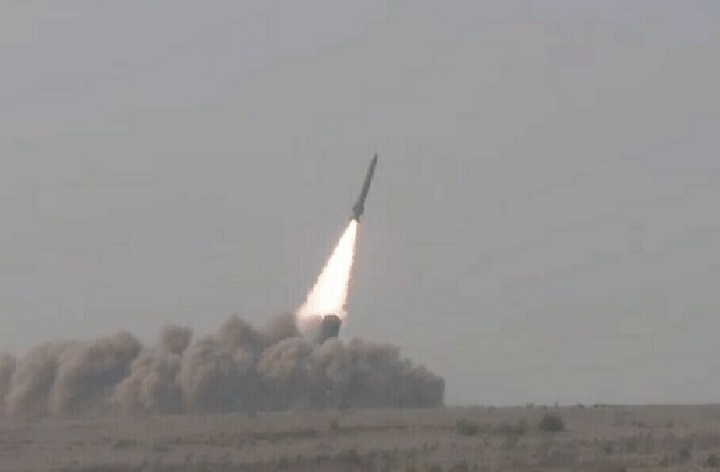On 27 December 2023, the media wing of the armed forces of Pakistan, ISPR, announced, “Pakistan today conducted successful flight test of Fatah-II, equipped with state of the art avionics, sophisticated navigation system and unique flight trajectory…. The weapon system is capable of engaging targets with high precision up to a range of 400 kilometres.”
Comment:
Prior to the launch, a US State Department press statement entitled “United States Sanctions Entities Contributing to Ballistic Missile Proliferation,” dated 20 October 20 2023, stated, “Today, we are designating three entities pursuant to Executive Order (E.O.) 13382, which targets proliferators of weapons of mass destruction and their means of delivery. These three entities, based in the People’s Republic of China (PRC), have worked to supply missile‐applicable items to Pakistan’s ballistic missile program.” Thus, the US sanctioned three China-based entities for having worked to supply missile-applicable items to Pakistan’s ballistic missile program. These additional set of sanctions is not the first American effort to contain Pakistan’s highly advanced ballistic missile program.
Since the dawn of the nuclear age, post-World War II, the United States aimed to control nuclear and ballistic missile technology, in order to maintain its global lead. However, America was unable to stop the spread of nuclear weapons, amongst major powers. Washington then created multiple technology control treaties with the participation of major nuclear powers. Examples include the Non-Proliferation Treaty (NPT), International Atomic Energy Agency (IAEA), supported regional Nuclear Weapons Free Zones (NWFZ) and dual-use technology cartels like MTCR, NSG, Australia Group and the Wassenaar Arrangement. These measures are in addition to America’s own export control measures, and sanction regime, to deny nuclear technology for military purposes.
The recently announced unilateral sanctions by United States, effectively targeting Pakistan’s ballistic missile program, will not be the last attack. Pakistan has entered the realm of advanced nuclear technology, developing its own nuclear weapons and ballistic missile program. It has exploited loopholes in nuclear nonproliferation regime, and dual-use supply chains. When the US failed to stop Pakistani advance towards achieving a credible deterrent capability, it resorted to threats and sanctions.
During the 1990s, the US slapped the Pressler sanctions against Pakistan. The US also resorted to spying and sabotaging, against Pakistan’s nuclear and ballistic program. According to former US contractor and whistle blower, Edward Snowden, top-secret budget documents, dubbed “black budget,” revealed an intense focus on Pakistan’s nuclear program. On 2 September 2013, the Washington Post published an article “Top-secret U.S. intelligence files show new levels of distrust of Pakistan,” which stated, “A 178-page summary of the U.S. intelligence community’s “black budget” shows that the United States has ramped up its surveillance of Pakistan’s nuclear arms, cites previously undisclosed concerns about biological and chemical sites there, and details efforts to assess the loyalties of counterterrorism sources recruited by the CIA.”
In addition, on 30 May 2019, Pakistan’s military sentenced one army officer to death, and another to 14 years “rigorous imprisonment,” for espionage, and leaking sensitive information to foreign spy agencies. A civilian doctor was also given the death penalty.
Bilateral strategic stability talks are another important mechanism for the United States to gain insight into Pakistan’s thinking on nuclear matters, and to put pressure on it. These talks often happen in secret. Significantly, no official readouts are available after 2016. The US Department of State press release of 17 May 2016, entitled “Eighth Round of Pakistan-United States Talks on Security, Strategic Stability, and Nonproliferation Issues” laid out US concerns regarding Pakistan’s nuclear developments, including “productive exchange of views on issues of mutual importance, including strategic export control regimes, nonproliferation, and regional stability and security.”
The so-called US concerns which remain from 2016 until now are related to:
1. Deployment of long-range ballistic missile Shaheen III
2. Testing of the Multiple Independently Targetable Reentry Vehicle (MIRV) missile system, Ababeel
3. Deployment of short-range Nasr missile system to deliver tactical nuclear weapons.
4. Production of fissile material, to make a large number of nuclear warheads.
These capabilities enable Pakistan not only to defeat India, which is America’s new henchman in South Asia. It also gives Pakistan a unique capability to target the entity of the Jews, as well as American bases in Middle East and Central Asia. The Shaheen III and MIRV missile Ababeel can defeat any Ballistic Missile Defense (BMD) deployed by the US. Weakening Pakistan’s missile program is in America’s strategic interest, if it wants India to truly become a ‘net security provider’ in the Indo-Pacific region.
Sincere elements in Pakistan’s military decision making must sever all links with the United States, including strategic stability talks. The US is only interested in damaging Pakistan’s deterrence capabilities, thereby creating strategic instability. This is whilst America arms and expands the military capabilities of India, through high-tech technology sharing. Pakistan’s decision makers must trust in Allah (swt) Alone. They must deploy its formidable deterrence force in the interest of Islam and Muslims. They must mobilize their large army, under the protection of a nuclear shield, to lead Muslim armies to victory in Al-Quds, Gaza and Kashmir. Not only this but also rescuing humanity, from the clutches of oppressive Capitalism, and spread the light of Islam to all corners of world. So, O officers of Pakistan’s armed forces, grant your Nussrah to Hizb ut Tahrir for the re-establishment of the Khilafah (Caliphate) on the Method of Prophethood, so that steps are taken to ensure the global dominance of Islam, as was the case for centuries before. Allah (swt) said,
[الَّذِينَ يَتَّخِذُونَ الْكَافِرِينَ أَوْلِيَاءَ مِن دُونِ الْمُؤْمِنِينَ أَيَبْتَغُونَ عِندَهُمُ الْعِزَّةَ فَإِنَّ الْعِزَّةَ لِلَّهِ جَمِيعًا]
“Those who take disbelievers for allies instead of believers, do they seek power with them? Verily, then to Allah belongs all power.” [Surah An-Nisa’a 4:139].
Muhammad Seljuk – Wilayah Pakistan

